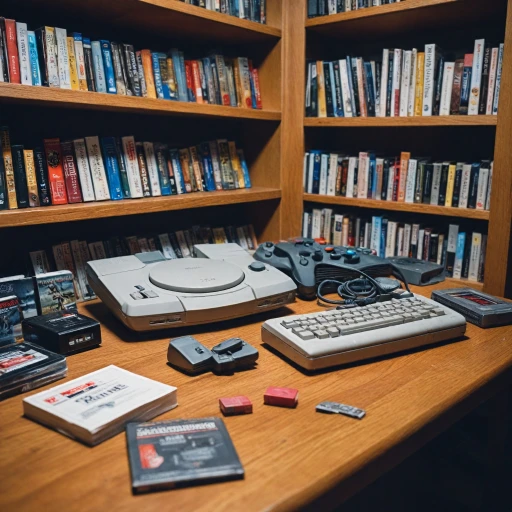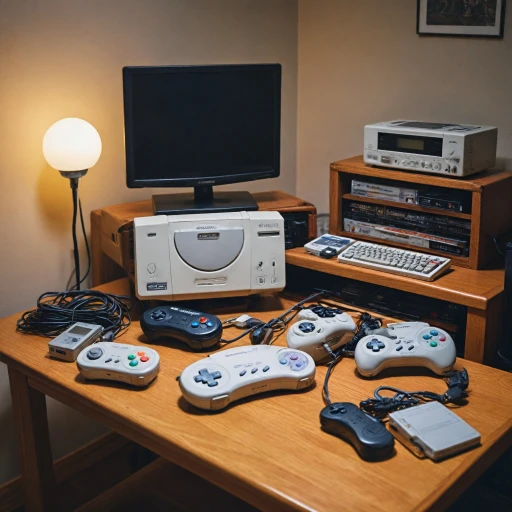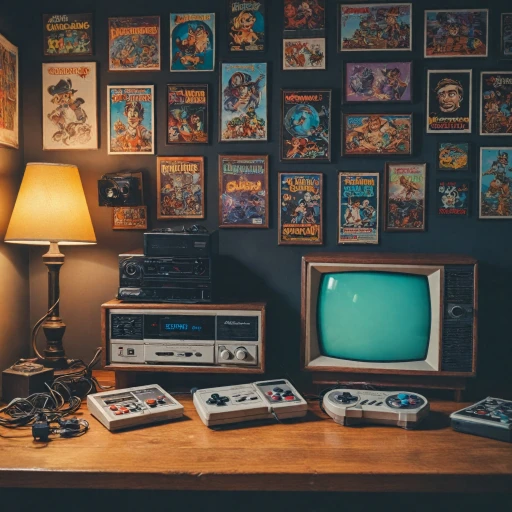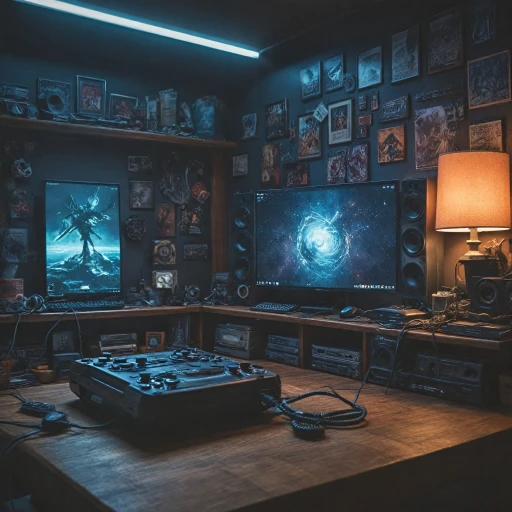Understanding Region Locking in Gaming Consoles
Decoding Region Locking in Gaming Consoles
Region locking is a practice that has long been part of the gaming industry, affecting how and where video games can be played. For those who enjoy delving into the world of retro consoles like the Sega Saturn, understanding this concept is crucial. Essentially, region locking is a form of digital rights management that restricts the use of a game or console to a specific geographical area. This means that a game purchased in North America might not work on a console bought in Japan.
The Sega Saturn, a beloved system among enthusiasts, is no stranger to these restrictions. Released in the mid-90s, the Saturn was Sega's answer to the rising competition from Sony's PlayStation and Nintendo's Game Boy. However, the console's regional locks can pose challenges for gamers looking to explore titles from different parts of the world.
Region locking can be particularly frustrating for collectors and fans of specific genres, such as fighting games like Virtua Fighter or Street Fighter, and action-packed shooting games. For those interested in titles only released in Japan, or those who want to experience the top games from the Japanese Sega Saturn library, these restrictions can be a significant hurdle.
Despite these challenges, there are ways to overcome region locking, allowing gamers to enjoy their favorite Saturn games from any region. From hardware modifications to software solutions, enthusiasts have found creative methods to bypass these limitations. However, it's essential to consider the legal and ethical implications of these actions, as well as the potential impact on the console's functionality.
For a deeper dive into the intricacies of region locking and its implications on gaming, you might find this exploration of the thrills of Mega Drive rail shooters insightful.
The Sega Saturn: A Brief Overview
Sega Saturn: Entry into the Console Market
The Sega Saturn came as a response to the evolving video game landscape in the 1990s, a time when gaming systems were gaining massive popularity worldwide. Released in 1994 in Japan and the following year in North America and Europe, it marked Sega's bold step to compete with rivals, notably the PlayStation and Nintendo. The console carried forward Sega's legacy of innovation and unique gaming experiences. The Saturn, distinguished by its powerful hardware, aimed to handle complex game mechanisms. It housed dual CPUs and eight processors, which allowed it to produce detailed graphics and immersive gameplay. Sega designed this console with arcade-style experiences in mind, an environment where it enjoyed remarkable success with titles like "Virtua Fighter." However, Sega's ambitious designs led to programming complexities for game developers, a factor that contributed to mixed success in the competitive market. Despite these challenges, the Saturn secured a loyal fan base, drawn to its wide range of video game genres including action, adventure, fighting games like "Street Fighter," and offbeat titles that offered unique experiences. The Saturn supported an extensive library of games, not only enhancing its appeal but also piquing the interest of retro gaming enthusiasts years later.Sega Saturn in Japan vs. North America
In Japan, the Saturn enjoyed significant popularity. Local sales were buoyed by remarkable exclusive titles that never made it overseas, causing the Japanese Saturn library to contain an array of gems highly sought by collectors. Shipping Japanese exclusive titles internationally became an aspect of its legacy, much appreciated by serious gamers looking to complete their collections despite the hurdles imposed by regional limitations and high post prices. North America saw a different narrative unfold. The PlayStation's rapid ascendancy in this region, combined with Nintendo's resilient market presence, overshadowed the Saturn's capabilities. Pricing strategies, delayed releases, and Sega's mixed focus left it disadvantaged. In summary, while the Sega Saturn may not have overtaken the PlayStation in popularity, especially outside of Japan, it stands as a testament to Sega's daring approach in the console wars. Its intricate design, innovative games, and the allure of its Japanese exclusives continue to captivate retro enthusiasts. For more insights into the intricate world of regional exclusivity and unauthorized services, check the exploration of Wii U online services.Challenges of Playing American Games on a Japanese Sega Saturn
Overcoming Regional Challenges: The Journey of Compatibility
Navigating the landscape of video game consoles, particularly with regard to regional restrictions, can quickly become a labyrinth of compatibility challenges. The Sega Saturn, an iconic console that debuted with cutting-edge technology for its time, was no exception to these challenges. For those attempting to play American games on a Japanese Sega Saturn, several hurdles must be addressed. Firstly, the Sega Saturn is inherently built with region-specific security, designed to offer protection against imported software. This mechanism was not merely a marketing strategy but also an effort to control distribution and pricing, particularly when taking into account factors like shipping and the varied retail landscape across regions like North America and Japan. For gamers eager to explore Saturn games beyond their local releases, this regional locking posed a significant barrier. Moreover, video formats such as NTSC Japan for Japanese systems versus NTSC-U for American games add another layer of complexity. This can affect the display and frame rate of action-packed games, possibly causing unintended disruptions in gameplay. Compatibility is not just about the software itself but the hardware's ability to interpret and present it correctly—a fact that holds true even when trying to savor quintessential Sega exclusives like 'Virtua Fighter' or enticing cross-overs like 'Marvel Super Heroes.' Availability and pricing are also pertinent considerations. Enthusiasts often resort to importing games, which can inflate costs due to shipping as well as potential shipping restrictions or post delays. Meanwhile, Japanese Sega Saturn consoles, though frequently sought after by collectors, add to this financial operational cycle due to their often premium price point. The dynamism in console gaming truly comes to life once the barriers of regionality can be overcome, paving the way for an enriched gaming experience. Whether your interests sit with action-packed street fighters or the finesse of a rail shooting game, delving into a diverse library unlocks new dimensions of gameplay thrills. For those adventurous gamers looking to delve into inclusive excitement, [unleash the fun] with innovative ways around these regional locking challenges.Hardware Modifications and Solutions
Hardware Tweaks: Bridging the Gap
Many gaming enthusiasts who wish to dive into the vibrant world of Japanese Sega Saturn games often find themselves facing the intricate challenge of region locking. The NTSC-J region, associated with Japan, requires specific hardware configurations distinct from its North American counterpart. To tackle the hardware discrepancy, there are a few modifications and solutions available:- Cartridge Adapters: One of the most common methods is using cartridge adapters. These devices fit into the cartridge slot of your Japanese Sega Saturn and can bypass region locking, enabling you to play American games. Models like the Action Replay also come with the added functionality of providing additional RAM for more extensive gaming experiences like "Street Fighter" or "Marvel Super Heroes."
- Modding the Console: For those more technically inclined, physically modifying the internals of the console is an option. By installing a mod chip, gamers can permanently unlock the system for all types of Saturn games. This solution, albeit effective, requires a deep understanding of the console's hardware and may void any warranties.
- Voltage Conversion: Additionally, it's vital to consider the electrical differences. Japanese consoles run at a different voltage compared to their American counterparts. Using a step-down converter ensures that the Japanese Saturn operates safely in different regions.
Software Solutions and Workarounds
Unlocking the Potential with Action Replay and Other Software
For those looking to play American games on a Japanese Sega Saturn without making any hardware modifications, software solutions present a viable path. One of the most popular methods is the use of the Action Replay cartridge. This tool not only allows you to bypass region locking but also offers additional benefits such as expanded memory and cheats to enhance your gaming experience. While the Action Replay does a splendid job, it's worth noting that some games, due to their complex coding or specific regional differences, may not run perfectly. Therefore, it is advisable to seek community posts joined around the Saturn games scene for user experiences and tips.Emulators and ROMs: The Digital Frontier
Alternatively, using emulators can be a compelling option for playing North American games on a Japanese Sega Saturn. Emulators, available for various platforms, mimic the original console's hardware allowing you to enjoy a wider range of games. However, it's important to remember that downloading ROMs of games you do not own can raise legal and ethical concerns.Staying Informed and Engaged
Keeping up with community forums can be enlightening. Engaged gamers and developers continuously discuss and share progress on hacking and bypass methods for the Sega Saturn. For instance, exploring the detailed posts focused on specific video games like "Virtua Fighter" or "Marvel Super Heroes" can provide insights into potential software solutions that work seamlessly across different Saturn systems. It's always exciting to explore the realm of Sega Saturn and its position alongside other consoles like PlayStation or Nintendo systems. Whether you're interested in an action, shooting, or classic fighting game, uncovering ways to enjoy your gaming library is a journey filled with collaborative insights and shared knowledge.Legal and Ethical Considerations
The Legal Perspective and Ethical Implications
Navigating the intricacies of playing American games on a Japanese Sega Saturn involves more than just technical know-how—it also demands an understanding of the legal landscape. Here’s what you need to know:- Region Locking Laws: Region locking, as discussed in earlier sections, can often pose significant barriers to aficionados of specific video game titles. This practice is legally supported in many jurisdictions, serving as a method for companies like Sega, Nintendo, and others to control the distribution of their products. Circumventing these locks may breach these legal standards, putting users at odds with regional laws.
- Intellectual Property Rights: Video games, constituting intellectual property, are governed by rigorous legal protections. By manipulating hardware or employing workarounds to play region-locked games, users may find themselves infringing upon these rights, particularly if such actions involve unauthorized use or reproduction of game content.
- Import Customs and Duties: The shipping and importing of gaming equipment such as consoles, especially in scenarios involving Japan and North America, can be quite onerous. Different countries have varied regulations concerning the importation of electronics, and failure to comply with these can lead to substantial fines or confiscation of goods.
- Piracy Concerns: While hardware modifications and software solutions may seem like an attractive avenue to circumvent region locks, there's a risk that these methods might open doors to piracy-related activities. This not only raises legal red flags but also poses ethical questions regarding the support and sustainability of the gaming industry's innovation and creativity.
- Consumer Rights and Fair Use: It's crucial for gamers to familiarize themselves with consumer rights and fair use policies in their region. In some locales, modifying your own equipment for personal use might fall under acceptable use, yet these rights are generally limited and vary widely. Therefore, understanding legal limits is vital to avoid unintended consequences.











